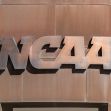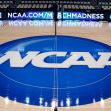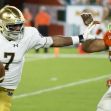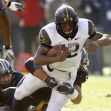Former University of Michigan football star Denard "Shoelace" Robinson is a named plaintiff in a class-action lawsuit against the NCAA. The lawsuit, filed Tuesday in the U.S. District Court for the Eastern District of Michigan, accuses the sports organization of denying him and other college athletes millions of dollars in compensation tied to their Name, Image, and Likeness (NIL). The lawsuit also names the Big Ten Network as a co-defendant.
Robinson, who played for Michigan from 2009 to 2012, alleges that the NCAA forced student-athletes to relinquish their NIL rights while profiting from their performances on the field. The complaint argues that the NCAA used players' likenesses to generate billions in revenue from viewership, advertising, and merchandise without compensating the athletes who drove that success.
Robinson is the lead plaintiff in the suit, representing all former University of Michigan football players who competed before 2016. The lawsuit seeks compensation for video footage and highlights featuring these players that were posted or licensed by the NCAA. It also targets the use of players' likenesses in video games, jerseys, and other products.
“The NCAA football season, heavily promoted through the use of these highlights and key moments, generates billions of dollars annually,” the complaint states. “Yet the student-athletes whose blood, sweat, and tears drive this revenue see none of it.”
The lawsuit adds to the mounting legal challenges the NCAA faces over NIL rights. It comes amid ongoing antitrust claims, which have led to a proposed $2.8 billion settlement involving current and former athletes. This deal would provide back pay and allow athletes to earn compensation from NIL deals going forward. However, the settlement faces hurdles, including objections from athletes and scrutiny from a federal judge regarding the distribution of funds and NIL payments.
Robinson, nicknamed "Shoelace" for playing with untied cleats, holds several records, including the most rushing yards and touchdowns by a quarterback in Michigan history. His likeness appeared on the cover of EA Sports' NCAA Football 14, the last installment of the popular video game series until this year. EA Sports recently relaunched the series with EA Sports College Football 25, a development that aligns with the resurgence of NIL rights discussions.
Name, Image, and Likeness (NIL) rights refer to the ability of college athletes to monetize their personal brand, including their name, image, or likeness, through endorsements, sponsorships, merchandise, and media. For decades, the NCAA prohibited student-athletes from earning money through NIL deals, asserting that college athletes should maintain amateur status. However, this rule changed in July 2021, when the NCAA updated its policies, allowing athletes to profit from their NIL for the first time.
The NIL reform marked a major shift in college sports, enabling athletes to sign endorsement deals, appear in advertisements, and profit from merchandise sales. This change came after significant legal pressure and public criticism of the NCAA's previous restrictions, which prevented athletes from earning income. At the same time, universities and other organizations profited from their talents and likenesses.
NIL rights are a central issue in Denard Robinson’s lawsuit against the NCAA. Robinson argues that he and other former athletes were unfairly deprived of millions of dollars in NIL compensation during their college careers. His case focuses on using player likenesses in media and merchandise, such as video games and jerseys, from which the NCAA and affiliated networks, like the Big Ten Network, benefited financially.
The lawsuit highlights the ongoing NIL debate—specifically, whether former athletes who played before the NIL policy changes in 2021 should be compensated retroactively for the use of their likenesses during their college years. This is an emerging legal question, as athletes like Robinson seek compensation for years of revenue generated from their image, even though they were not allowed to benefit at the time.






